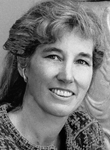Meet the 'alloparents': Shared child care gave rise to human altruism, says Hrdy
By Joseph Mansky

A photograph of a terrier surrounded by kittens flashed on the screen. The dog, said A.D. White Professor-at-Large Sarah Hrdy, "chased away a very surprised mother cat, and proceeded to spontaneously lactate and suckle her kittens." Since this dog descends from "cooperatively breeding wolves," Hrdy said, "maybe we shouldn't be surprised, but the kittens are going to grow up a little bit confused."
Hrdy, professor emerita of anthropology at the University of California-Davis, a renowned anthropologist, primatologist and human behaviorist, presented"The Origin of Emotionally Modern Humans: What It Means to Develop and Evolve as a Cooperatively Breeding Ape" Oct. 17 in the Biotechnology Building during her first visit to campus as an A.D. White professor.
While the conventional stereotype of the human family is based on the "father the hunter who provisions woman the nurturer" model, Hrdy among others has begun to revise this conventional model to include care and provisioning by "alloparents": group members other than the genetic parents, she said. This is called "cooperative breeding."
"There's something that's really fairly unusual about the human species, which is our peculiar interest in helping others," Hrdy asserted, a trait that distinguishes us from most other primates.
She argued that long before behaviorally and anatomically modern humans evolved 100,000 and 200,000 years ago, "emotionally modern humans, other-regarding and actually questing for intersubjective engagement with other individuals, were already beginning to emerge."
Suggesting that cooperative breeding led to the emergence of emotionally modern humans, Hrdy hypothesized "that our ancestors were already very, very different from chimpanzees. ... This is really the prequel to the major human developments later on," she added.
According to Hrdy, "the most widely cited explanation" for altruistic behavior among humans is the "lethal inter-group conflict hypothesis," which posits that generosity and solidarity emerged along with hostilities between groups. However, Hrdy said that even if humans and chimpanzees share "a common heritage of intergroup warfare," she worries "that by focusing so exclusively on warfare, we overlook other conditions such as the un-apelike way our ancestors were reared that are just as important for explaining the initial emergence of other-regarding tendencies."
Anthropological data from traditional societies show that "having allomaternal caretakers is correlated with child survival," Hrdy said. "We didn't realize this sooner," she added, because the developed world has a 98 percent infant survival rate compared with 20 percent to 60 percent among these indigenous groups.
In a hunter-gatherer society, Hrdy claimed, "to compensate for shortfalls, you have to have alloparents in addition to parents; that's the main reason for the paradigm shift" to a cooperative breeding model where kin and other group members help rear the mother's children.
"In order for this to work, you have to have flexible residence patterns," she added, so that you have access to "individuals who will help care for and help provision your children" and so that you find "opportunities to give child care to kin who still need it."
Various experiments "reveal surprising altruistic, other-regarding impulses in cooperatively breeding tamarinds and marmosets," Hrdy observed. Ultimately, "being a cooperative breeder is a lot more important than having a big brain," she said, as far as altruistic behavior is concerned.
While on campus, Hrdy also met with undergraduates in a Writing in the Majors class, spoke to an Introduction to Behavior class, participated in discussions with graduate students in psychology, talked with faculty and graduate students about issues in the field of anthropology and attended an afternoon tea with undergraduates at Alice Cook House. At the Tompkins County Public Library, Hrdy spoke about why fathers are so variable in their commitment to parenting.
Joseph Mansky '12 is a writer intern for the Cornell Chronicle.
Media Contact
Get Cornell news delivered right to your inbox.
Subscribe